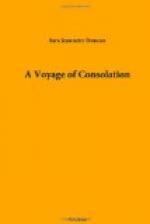A quarter of an hour later we were rolling through Rome. As a family we were rather subdued by the idea that it was Rome, there was such immense significance even in the streets with tramways, though it was rather an atmosphere than anything of definite detail; but no such impression weighed upon the Malts. They took Rome at its face value and refused to recognise the unearned increment heaped up by the centuries. However, as we were divided in two carriages, none of us had all the Malts.
It was warm and dusty, the air had a malarious taste. We drove first, I remember, to the American druggist’s in the Piazza di Spagna for some magnesia Mrs. Malt wanted for Emmeline, who had prickly heat. It was annoying to have one’s first Roman impressions confused with Emmeline and magnesia and prickly heat; but Mrs. Malt appeared to think that Rome attracted visitors chiefly by means of that American druggist. She said she was perfectly certain we should find an American dentist there, too, if we only took the time to look him up. I can’t say whether she took the time. We didn’t.
It was interesting, the Piazza di Spagna, because that is where everybody who has read “Roba di Roma” knows that the English and Americans have lived ever since the days when dear old Mr. Story and the rest used to coach it from Civita Vecchia—in hotels, and pensions, and apartments, the people in Marion Crawford’s novels. We could only decide that the plain, severe, many-storied houses with the shops underneath had charms inside to compensate for their outward lack. Not a tree anywhere, not a scrap of grass, only the lava pavement, and the view of the druggist’s shop and the tourists’ agency office. Miss Callis said she didn’t see why man should be for ever bound up with the vegetable creation—it was like living in a perpetual salad—and was disposed to defend the Piazza di Spagna at all points, it looked so nice and expensive. But Miss Callis’s tastes were very distinctly urban.
That druggist’s establishment was on the Pincian Hill! It seemed, on reflection, an outrage. We all looked about us, when we discovered this, for the other six, and another of the foolish geographical illusions of the school-room was shattered for each of us. The Rome of my imagination was as distinctly seven-hilled as a quadruped is four-legged, the Rome I saw had no eminences to speak of anywhere. Perhaps, as poppa suggested, business had moved away from the hills and we should find them in the suburbs, but this we were obliged to leave unascertained.
Through the warm empty streets we drove and looked at Rome. It was driving through time, through history, through art, and going backward. And through the Christian religion, for we started where the pillar of Pius IX., setting forth the doctrine of the Immaculate Conception, reaffirmed a modern dogma of the great church across the Tiber; and we rattled on past other and earlier memorials of that




